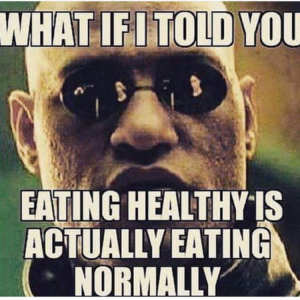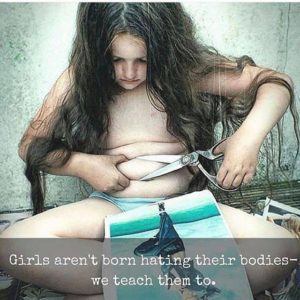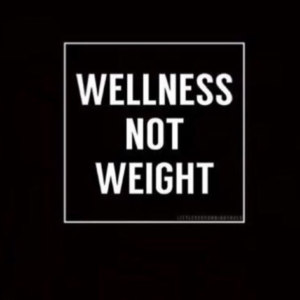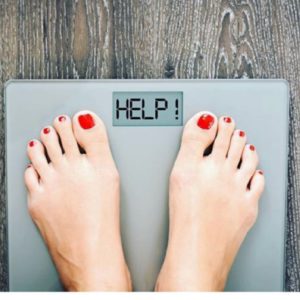The quickest path to an Eating Disorder
I still remember the look in my friend’s dad’s eyes as he handed me my first warning. He was the only adult to see my trajectory before I could see it myself and I’ll forever remember this. Unfortunately, it wasn’t a gift I was able to unwrap at the time and it took me years of hell before I could look back at his words with gratitude.
His daughter wasn’t a close friend — she was a friend of a friend I’d see no more than a handful of times. Her dad ran a successful construction company and had a work event in LA, so he took his daughter and two friends for an all-expenses-paid long weekend.
He’d lived through a near-death open-heart surgery and was my first experience of a spiritual person; aligned in values and actions, committed to seeing and loving those in his life while he was here. My two friends and I were all trapped within similar obsessions; boys, body image, and external validation seeking. But I was the only one on a fad diet at fourteen years old.
Although this culture has a lot of problems contributing to body dysmorphia and disorderly eating, this article focuses exclusively on the biological and psychological patterns created by fad dieting. I created my own prison by setting up patterns within my biology and psychology which took years to understand and dismantle. This is something that I believe young women can avoid if they’re equipped with the knowledge to make personal choices from a place of awareness and empowerment instead of dogma.
I remember going out to lunch at a steak-house on our last day in LA during this weekend. I ordered a grilled chicken salad with a slice of lemon for dressing. No added carbs or fat. I remember thoroughly wiping oil off the chicken strips with a napkin — a ritual I damn near perfected by the age of seventeen.

When normal and common get confused
This steak-house trip was the last meal my friend’s father would witness me pick at. When he asked me what I was doing, I informed him that I was on a diet. He looked into my eyes and said “be careful with that.”
This was the best foresight I’d ever received growing up. This just shows how badly I needed to be seen and guided during such a vulnerable time in life. This man spent one weekend with me, didn’t know anything about me, and yet he knew that I was playing with fire by restrictive dieting as an already-slim thirteen year old girl.
An epidemic of Disorderly Eating
Almost half of American children between 1st – 3rd grade want to be thinner and half of nine and ten year old girls are dieting. NINE YEARS OLD. Unfortunately I know this to be true because I was one of these girls; obsessing over my leg size at the age of nine, despite never having a weight issue!
The South Carolina Department of Mental Health estimates that 8 million Americans (seven million women and one million men) have an eating disorder. Eating disorder statistics provided by the National Eating Disorder Association are even higher, and indicate that 10 million American women suffer from eating disorders. Ten-fifteen percent of all Americans suffer from some type of serious eating disorder.
Seventy-seven percent of individuals with eating disorders report that the illness can last anywhere from one to fifteen years or even longer in some cases. Two to three in one hundred American women suffers from bulimia. As many as ten percent of college women suffer from a clinical or nearly clinical eating disorder, and this is the women that actually seek treatment. My guess is that the numbers are actually MUCH higher.

Thirty-five percent of “occasional dieters” progress into pathological dieting, (disordered eating) and as many as twenty-five percent advance to developing full-blown eating disorders. The incidence of bulimia in 10-39 year old women TRIPLED between 1988 and 1993. What is causing this increase??
Enter Fad dieting
An estimated 45 million Americans go on a diet each year and Americans spend an average of $33 billion each year on weight loss products. And yet, nearly two-thirds of Americans are overweight or obese, despite this trend towards perpetual dieting. Ninety-five percent of diets fail and most Americans will regain their lost weight within one to five years. Seventy percent of American women surveyed endorse unhealthy thoughts, feelings, or behaviors related to food or their bodies and ninety-one percent of women recently surveyed on a college campus had attempted to control their weight through dieting. Twenty-two percent of women in this survey dieted “often” or “always”.
I don’t offer these statistics to overwhelm you with numbers (which could easily be erroneous since so many of these struggles remain untreated) but to give you perspective on the scope of this modern epidemic. This article also isn’t aimed at addressing the obesity epidemic. This article’s aimed to address the young impressionable women who catch fad dieting like a disease which shapes their lives and self-worth for years, with potential catastrophic impacts on their biological and mental health.
I don’t believe that Fad Dieting is the only contributing factor to the development of an eating disorder. However, I will say from examining the statistics and from living through this struggle firsthand, that it is often a huge factor. Let me elaborate by breaking down what a fad diet is.
Fad: a temporary fashion, notion, manner of conduct, etc., especially one followed enthusiastically by a group. Diet: such a selection or a limitation on the amount a person eats for reducing weight. The whole gist is that being thin is the top priority AND there’s a specific formula (diet) to get you to Thin Town. It doesn’t matter if you’re already thin or that your weight is a result of your overall metabolic function because there’s enough social proof (fad) to verify that this solution works!
I chose this Webster’s definition for diet because the other two describe diet as “food choices made to cure or address specific illnesses or health goals.” Personalized diets designed to address health goals isn’t what this article’s about.
Unfortunately a side-effect of living in a culture where junk food is normalized is that many people avoid healthier choices out of fear they might “catch” disorderly eating if they do. As if Orthorexia was a common bug we might catch if we start learning about how our own bodies relate to food.
I speak with women regularly who struggle with health symptoms but refuse to change their food choices because their fear of orthorexia is so great. This is a valid concern if you look at the statistics above, but living with chronic symptoms disrupting your daily life isn’t sustainable either.

We need to get our intentions straight
It’s unfortunate that being healthy has become a billion dollar industry and the only way for this industry to keep selling food bars and diet books is if we all keep succumbing to the propaganda. The whole industry benefits from our confusion and fear around how our own bodies work. You could potentially take even the most useful dietary theory and turn it into a religion tailored to everyone and no one. This is a recipe for an eating disorder.
So this begs the question, then: How do we know whether our dieting behaviors are empowering us or creating neuroticism and disorder? Let’s look at evolution and science.
Functional and evolutionary perspectives towards dieting and health
When I was twenty-four I wrote an email to the author and environmental activist, Derrick Jensen. Touched by his books and ability to tie together personal trauma with larger cultural issues, I shared my eating disorder story with him. I was surprised when he sent me a very thoughtful and lengthy response, in which he referred to my eating disorder as “a disease of civilization.”
A fad strikes me as different in nature than tailoring personal food choices to heal from a known illness. An unfortunate side-effect of living in a culture where junk food is normalized is people avoiding healthier choices out of fear they might”catch” disorderly eating through their newfound discretions. As if Orthorexia was a common bug flying around.
I speak with women regularly who struggle with health symptoms, yet refuse to address their diets because the fear of neurosis is so big. It’s a real and valid concern if you look at the statistics above, and yet living with chronic symptoms and a lower quality of life is no solution.
As a health-conscious vegan of twenty-five, my body had deteriorated so that I was forced to reexamine my dogmatic beliefs towards animal consumption. Despite plenty of expert advice and bodily queues, I spent years denying that my body could need something outside the scope of what my fad diet offered (in my case, vegan was the fad.)
I managed to get a free thirty-minute consult with Julia Ross, the prolific psychotherapist known as one of the first experts to team up with dietitians and use food and amino acid therapy to heal mood disorders, eating disorders, and addictions. Her success rate was groundbreaking and continues to work miracles.
In looking back, I’m not sure what’s crazier; the fact that I was able to get a consult at all OR that I was unwilling to take her expert advice! In fact, I resented her advice. I was a strict vegan at the time, living in a yoga ashram which forbid meat consumption. In my consult, she told me that in order to heal my impulsive eating, disorderly moods, and unstable energy I would need to eat more animal protein. I was so angry at this suggestion I almost hung up on her!

stop telling me what I don’t want to hear!
Julia wasn’t the only health professional to make this suggestion to me. Another therapist specializing in ED recovery said the same thing during a consult, followed by a naturopath a year later. The naturopath pleaded with me to add meat into at least 10% of my diet after viewing my lab results showing severe hypoglycemia I told myself they were all crazy and continued to struggle with binging and mood swings for years.
It got to the point where my my struggles included severe insomnia, amenorrhea, fatigue, anxiety, cravings, binges, digestive issues, and perpetual foggy thinking. The idea that maybe these professionals weren’t so crazy finally began to take root. I found myself in my first real functional medicine clinic, receiving lab results showing that my vegan diet of kale juice, almond butter, sprouted beans and rice was deteriorating my biology… and worse still — it was making me act like a crazy person! This was information my body and behaviors had been telling me for years, but here’s the thing, guys:
eating disorders are often the results of a diet, belief system, and culture which aren’t aligned with what we need on a personal level.

Getting labs done is a great way to see what your fad diet is REALLY doing to your body
Unless we’re willing to admit that our dietary dogma might be wrong, we probably won’t heal. After I began eating animals again, it took a few years of tinkering in the dark and struggling with guilt and self-doubt before I began to feel like myself again. I’d lived with unaddressed chronic symptoms for so long that it was like finding the person I’d never had the strength to be.
Once I started feeling better, I became invested in the history and science living in my own biological story. I wanted to understand what Derrick Jensen meant with his term “diseases of civilization.” I realized I wasn’t alone in my struggles because this eating disorder wasn’t just personal — it was cultural.
Over time, my approach to my own health evolved and continues to evolve. I found Nourishing Traditions and sank my teeth into the brilliant work of Weston A. Price and other professionals studying health and behavioral sciences. It became more clear over time just how damaging my early fad diets of fat-free cottage cheese, turkey bacon, and dry toast had been on my already fragile body and mind.
Over the past four years, I’ve grown more accustomed to calling my broader approach to health Ancestral or Evolutionary Medicine. This is the practice of combining evolutionary sciences with what modern biochemistry is telling us about how nutrition works in the human body. We examine the root-cause of modern chronic illness and maladaptive coping behaviors (like eating disorders and addictions) and we ask ourselves how might modern industrial diets and lifestyles (including fad diets) be contributing to these illnesses and behaviors?
I discovered medical clinicians working within the framework called functional medicine who were getting serious results with their patients through this ancestral approach to diet and lifestyle medicine. I also found countless stories of disorderly eating struggles being treated through similar diets along with things like trauma therapy, mindfulness practices, nature exposure, and community support. As I began to see consistent improvements with my own symptoms and eating behaviors, my lab results correlatively got better. And I naturally let go of the dogmatic world of dieting.
But let me return to those early stages of transition in my mid-twenties again for a minute…
By age twenty-five, I was already dabbling with meat consumption, but this usually involved an impulsive late-night bistro trip with me desperately shoveling lamb into my mouth where no one could see me. I was so unaware (or in denial) of my own biological animal drives that this impulsive behavior was seen as a shameful personal weakness instead of a dietary misalignment.
Want to know the worst way to eat, friends? In secret.
But this is exactly what most fad diets silently endorse through the unsustainable nature of their methods. Our species spent most of our history with the constant threat of food-scarcity. We are beautifully designed with the primal drive to eat as much food as possible when it’s available to us, especially if we’re imbalanced. If we’re missing core nutrients (protein, anyone?)… this drive isn’t going to go away simply because the health industry offers us some restrictive solutions based on … numbers or dogma.
In his book The Hungry Brain, Dr. Stephen Guyenet — leading researcher on body fatness, obesity, and appetite regulation — describes how humans innately relate to food… and it doesn’t involve numbers. He speaks directly to the fad diet phenomenon and why it is that people have initial success with calorie-restricting diets and why this success is generally short-lived. Although calories are burnt and stored as energy and we will lose weight when burning more calories than we eat, the calorie game alone is a very dangerous game to play for biological and psychological reasons.

Focusing on numbers is a great path to neurosis
Biologically, calories aren’t equal and some of the most nutrient-dense foods on the planet have a higher calorie content — which get utilized for crucial bodily functions. Psychologically, when we relate to our bodies and our food in numbers, we begin to behave in neurotic and maladaptive ways, which is where eating disorders begin to take shape.
Unfortunately, modern living does require that we navigate daily environments which trip up our ancient “eat it all now” wiring. Therefore, we do need to be selective with what we choose to eat each day. This natural wiring is stronger than the solutions given in fad diets so following these diets without understanding this wiring will only create inner-conflict.
In fact, this is what I see fad diets creating; lives of daily inner-conflict.
In Closing
At this point I hope I’ve painted a clear picture as to why following ANY fad diet (even one which offers healthy food options) without first understanding of our own human bio/spycho/spiritual needs can be devastating to our health and long-term success — especially for young women. I can’t emphasize that last point enough; young women are at the greatest risk of developing an eating disorder or body dysmorphia in this culture. It is our responsibility to support those younger than us in navigating a culture which unfortunately profits greatly from insecurity and self-ignorance.
I believe it’s my personal responsibility as both a health coach and as a refugee of the fad dieting hell realms to support women in understanding that fad diets don’t work. They are prisons.
If you combine the scientific methodology of functional medicine with an evolutionary perspective, you’ll end up asking better questions about eating disorders and how to both avoid and treat them. If you work with a clinician or allied provider, you won’t be doing this work alone and can address your body dysmorphia and eating patterns with someone who has the bigger picture and your whole being in mind.
Obviously, unwrapping an eating disorder and separating ourselves from the cultural dogma which we’r all immersed in is not as simple as just reading some articles and calling it a day; it’s personal and complex. I hope this article speaks to someone who struggles with dieting and/or disorderly eating. Share it with anyone who might benefit. And please reach out to me personally or in the comments if you have thoughts.





